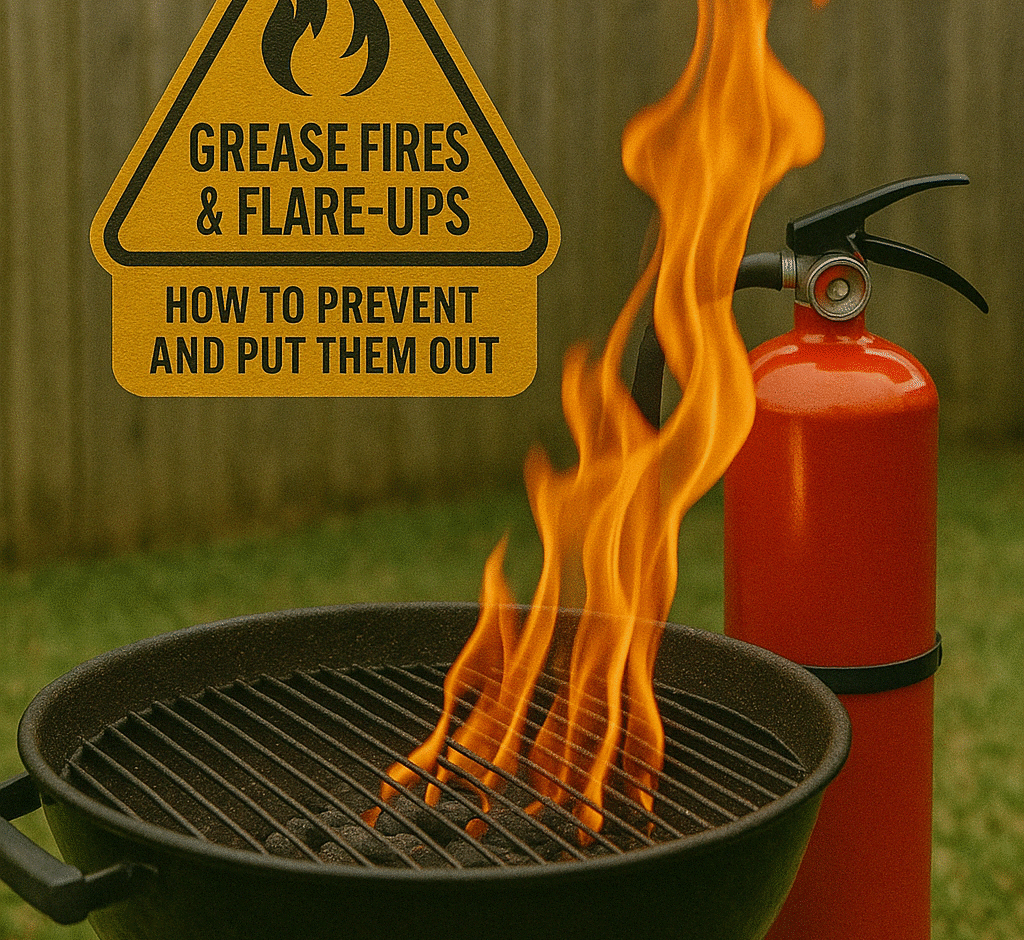
A moment of flame can ruin your whole BBQ. Learn the difference between flare-ups and grease fires — and how to stop both before they get out of hand.
Don’t Let a Sizzle Become a Scare
Grill masters know a little flame adds flavor — but too much, too fast? That’s a recipe for disaster. Grease fires and flare-ups are some of the most common (and dangerous) grill problems. This article breaks down what causes them, how to prevent them, and what to do if they strike mid-BBQ.
Flare-Ups vs. Grease Fires: What’s the Difference?
Flare-ups are quick bursts of flame when fat drips onto hot coals or burners. They’re normal — but should be brief and manageable.
Grease fires are much more serious. They happen when built-up grease in the grill or grease tray ignites and burns uncontrollably, often spreading beyond the grill itself.
Prevention Starts with a Clean Grill
Old grease and leftover gunk are like fuel waiting for a spark. To avoid flare-ups and grease fires:
- Scrape down your grates before and after every cook
- Empty and clean your grease tray regularly
- Use a grill brush or scraper to keep buildup at bay
- Inspect the bottom of your grill — that’s where grease hides
Trim the Fat (Literally)
Marbled meats are delicious, but too much fat can cause major drips and flames. To reduce risk:
- Trim excess fat from meats before grilling
- Use leaner cuts for longer cooks
- Let greasy marinades drip off before placing meat on the grill
Master Heat Management
Controlling heat helps prevent flare-ups from turning into full-blown fires:
- Use a two-zone setup (hot side / cool side)
- Move food to the cool zone during flare-ups
- Avoid cooking with the lid open for too long — it can fan the flames
- Keep the lid closed to smother flames, not feed them oxygen
What to Do During a Flare-Up
- Stay calm – it’s common and usually easy to control
- Move food away from the flames
- Close the lid to limit oxygen and reduce the flame
- Use a spray bottle of water if it’s a small charcoal flare-up
- Never use water on gas grills or grease fires
What to Do in a Grease Fire Emergency
Grease fires require a different approach:
- Turn off the burners or gas tank immediately
- Close the lid to smother flames
- DO NOT use water – it can spread the fire
- Use a fire extinguisher rated for grease (Class B)
- Call 911 if it’s not under control within seconds
Have baking soda on hand as a backup — it can help smother small grease fires in a pinch.
Dress for Fire Safety
It’s not just about the grill — it’s about you. Avoid wearing:
- Loose-fitting clothes
- Hanging apron strings
- Flammable fabrics
Stick to short sleeves or roll them up, and never lean over the grill while lighting or cooking.
The Right Tools = Better Control
Long-handled tongs, meat forks, and heat-resistant gloves give you distance and control. Avoid using short utensils or anything plastic that can melt in the heat of the moment.
Fire Happens Fast — Be Ready
Every second counts during a fire. Keep a fire extinguisher, baking soda, or even a heavy-duty lid nearby so you’re never caught off guard. A few seconds of prep can prevent a dangerous situation from getting worse.
Fire Up the Flavor, Not the Danger
BBQ should be bold — not reckless. With the right habits and gear, you can enjoy flame-grilled food without ever worrying about things getting out of hand. Respect the fire, and it’ll respect your ribs.
